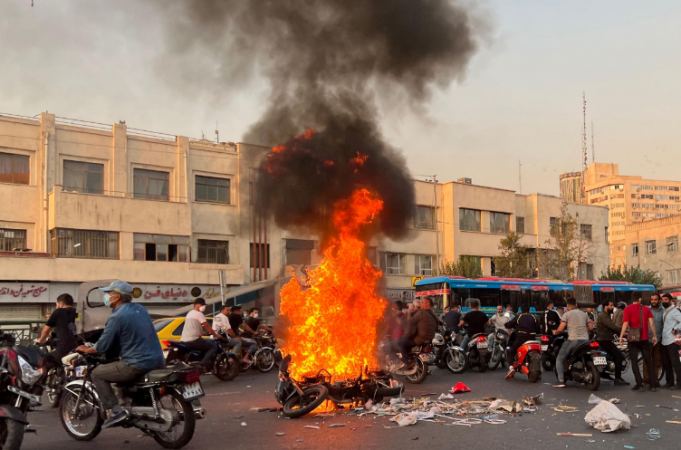
NY City: Demonstrations in Iran following the death of Mahsa Amini in police custody are the most recent in a long line of protests that rocked the Islamic republic since 1999.
They all faced brutal regime action, resulting in many deaths or serious injuries as well as the imprisonment of thousands of political prisoners.
For example, students participated in massively violent protests in July 1999 and four years later went back on the streets demanding justice for those who were killed and injured during earlier demonstrations.
Also Read: Top diplomat: EU confirms Iranian involvement in the war in Ukraine
Mahmoud Ahmadinejad's victory in 2009 sparked unrest that lasted well into 2010 and erupted again the following year and in 2012. Recently, between 2017 and 2021, there have been several political movements, civil disobedience campaigns, online activism campaigns and protests. ,
Irene Khan, the UN Special Envoy on the Promotion and Protection of the Right to Freedom of Opinion and Expression, described the ongoing protests in response to Amini's death.
September 16 as the "revolt of young people, very young people, adolescents and young women", and he described them as "the rebellion of young people, very young people and young women".
Amini was detained three days ago for failing to follow strict head covering rules. Because of this, he argued, the Iranian government may now find itself in a different position than before.
According to Khan, "the issue was raised from the body language of women." The right of expression for women includes the decision to wear the hijab.
In all her reports, including the most recent one presented to the General Assembly this month, Khan consistently draws attention to the ways politics, culture and customs undermine women's rights to express themselves. Huh.
She said that girls in Iran are now responding to such repression by saying, "We will not allow our rights to be suppressed in the same way as the rights of our mothers and grandmothers have been suppressed."
According to Khan, another difference between the current protests and the previous protests is the increased access to cutting-edge digital technology.
Khan has suggested to the General Assembly that a similar commitment to the use of technology to uphold human rights should be adopted and implemented globally.
Also Read: Rajev Paul, who starred in Sasural Simar Ka 2, got married a second time?
For example, some online platforms have gone above and beyond to make it as simple as possible for citizens in Ukraine to access and use information.
It claimed that platforms, social media and digital technology all play an important role in Iran.
When you consider what is happening to young women, the overall problem of youth unemployment, and the despair of young people, the Iranian government may find itself in a different position than in the past.
Khan said her advice to Iran's rulers is straightforward: "Stop infringing on people's rights. The right to peaceful protest is a human right. Women are free to wear or not wear the hijab. It's something I've long known for." Time told.
"These fundamental questions of freedom of expression, human dignity, and women's control over their own bodies must be left to decision-making, and the government must act ethically and in accordance with human rights standards."
The United Nations General Assembly passed a resolution in 2009 condemning human rights abuses by the Iranian government. Fact-finding missions have been organized to monitor violations and gather evidence so that one day the world can hold criminals accountable.
According to UN spokesman Stephane Dujarric, Secretary-General Antonio Guterres is monitoring the situation in Iran "very carefully", where human rights mechanisms have been activated.
Yet, despite warnings that the situation is getting worse by the day, there is increasing pressure on the United Nations to take a more aggressive approach to what is happening in Iran with regard to human rights.
While Iran's government will not allow a UN special envoy to visit the country, and some rules and regulations prohibit experts like himself from making all information public, Khan told Arab News that "we certainly are behind the scenes". We are working very hard - and very soon, publicly - to put as much pressure as possible to ensure that people within their rights can protest peacefully."
According to our code of conduct, which was established because we were appointed by the (Human Rights) Council, we are required to notify the Iranian government before publishing anything.
Some things about Mahsa Amini case have been published by us. More will be done by us. More action would be good.
“In that sense, the mechanism has been in motion for some time. Additional measures are needed, for example, in cases of widespread violations, where the country of origin has refused to allow the special correspondent to visit ?Therefore, we do have a feeling, a problem.
Also Read: Iranian activists are urging new demonstrations
In a nation like Iran, where the government frequently reverts to violent crackdowns against dissent that have left hundreds dead, thousands injured, and thousands more in jail, does she believe that anyone will ever be held accountable for the crimes committed against the people as investigations are conducted and evidence is gathered?